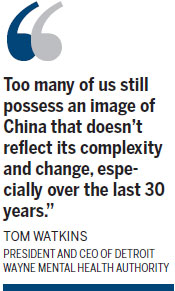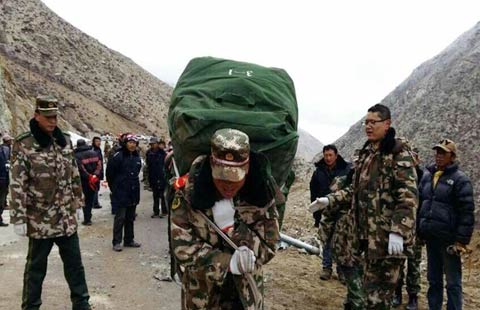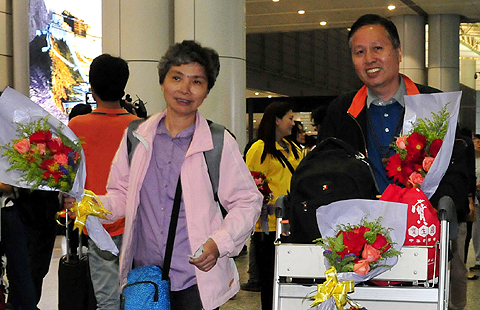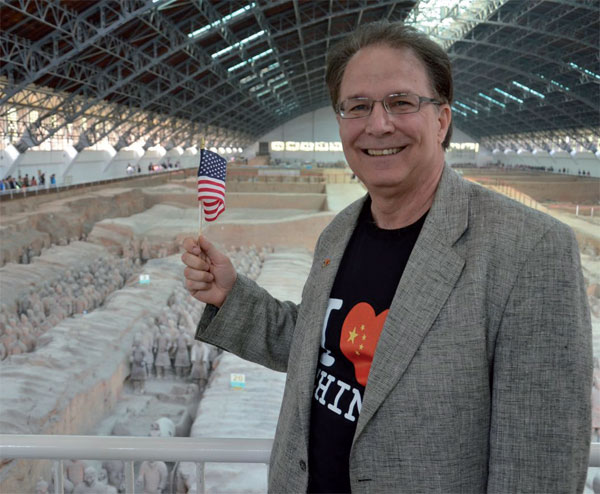Building bridges from Michigan to China
Updated: 2014-11-28 13:20
By Paul Welitzkin In New York(China Daily USA)
|
||||||||

|
Tom Watkins, a decades-long traveler to China, is dedicated to expanding Michigan's ties with China. Provided to China Daily |

As Governor Rick Snyder wraps up another extended trip to China, Michigan continues to be a leader among US states in developing economic and cultural ties with China.
And Tom Watkins has emerged as a driving force behind the Wolverine state's expanding relationship with China. A former state superintendent for Michigan public schools and former state mental health director, Watkins is a decades-long traveler to China and he has consulted on China economic development and education issues. He is currently the president and CEO of the Detroit Wayne Mental Health Authority in Michigan.
His interest in China began in elementary school in the 1960s when a fourth-grade teacher turned the spotlight on China.
"Looking back, I believe it was the juxtaposition of the ideal of what I was being taught about what America stood for against the reality I saw through my 10-year-old eyes while growing up in our nation's capital, with segregation and poverty abounding. That, along with the Chinese spin that espoused total equality in China, created a life-long fascination with the country. I have had my eyes on China ever since," he said.
It would be more than 20 years before Watkins experienced China personally. In 1988 he organized an international mental health conference in Detroit. Among the participants were four mental health officials from China. As a favor, the officials invited Watkins to China and in 1989, his first trip to the mainland included stops in Beijing, Nanjing and Xi'an, where he toured mental health facilities.
On that trip, Watkins began a custom that has served him well. "Since it was the 1980s, I carried a Polaroid (a camera that took instant photographs) and I would not only take pictures of the Chinese but also of myself and give them the photo so I could leave something behind. This proved to be very beneficial in building a relationship and creating a two-way exchange, which is something I still try to do today," he told China Daily in an interview.
That year Watkins made another visit to China, stopping in Harbin and taking the train from Beijing to Tibet. That trip began for him the process of unlocking China's history, culture and society.
"I found the Chinese people curious and interested in me and the United States," he said. "Remember, in the 1980s, both the US and China were just beginning to open up to each other. I know I learned a lot about the Chinese people, their culture and history. I would like to think I helped them to learn at least a little about the US as well."
When visiting China, Watkins likes to totally immerse himself in the country and its people. "I try to stay in Chinese hotels rather than Western hotels operating in the country," he said. "I find that this helps me to understand and experience China in a much more personal way."
Because of his many trips to China, Watkins has been able to explore some of the lesser-known areas of the country. "I have been to the mountains near Zhangjiajie in Hunan province," he said. "These contain some of the most spectacular scenery anywhere in the world. It was used as a model for some of the background shots in the movie Avatar."
Watkins believes that Americans need to educate themselves about China. "Too many of us still possess an image of China that doesn't reflect its complexity and change, especially over the last 30 years," he said. "We are still beholden to an image of China that was formed when our parents told us to eat everything on our plates - there are children starving in China. China is a modern nation and society that happens to include a 5,000-year history."
Watkins spends a lot of his time trying to help build upon the Michigan-China connection. Michigan has one of the more enduring relationships with China. Michigan's own Leonard Woodcock, a former president of the United Automobile Workers (UAW) union, was named by President Carter in 1977 to be chief liaison to China. Two years later, Woodcock became the first US ambassador to the People's Republic of China.
Michigan is slowly rebuilding its economy as it seeks to recover from the downturn caused by the 2008 financial crisis. Most agree that Michigan suffered the most, as Detroit, the state's largest city and the epicenter of the US automobile industry, is just starting to emerge from bankruptcy.
Watkins believes that China will be a crucial part of the state's economic recovery. "Michigan has everything that China will want or need. From autos to tourism to food, Michigan can provide the products and services that will help fuel the middle-class growth China wants," he said.
Watkins believes that tourism may serve as the state's ace in the hole when it comes to nurturing economic ties with China. Already home to a thriving tourist trade thanks to an abundance of water and other natural attractions, Watkins thinks China's rising middle-class will seek a US vacation alternative once they have explored New York, Las Vegas and Disney World.
"After spending time in Shanghai and Beijing and experiencing all the pollution in those cities, I believe the Chinese will want a place with fresh air, clear rivers and lakes and green forests. I don't see any reason why they can't enjoy Tahquamenon Falls in the Upper Peninsula or a freshwater lake as large as an ocean (Lake Superior)," he said.
Watkins calls the US-China relationship the most important bilateral relationship in the world today. "Every major issue is going to intersect between Beijing and Washington. I believe the recent agreements on emissions and visas between China and the US are good and at least both sides are engaged in productive discussions."
Just because of their sheer size, Watkins believes it's vital that China and the US maintain a good connection. "To have a world with the US and China at odds is simply unimaginable to me," he said.
paulwelitzkin@chinadailyusa.com

 International rescue teams head to quake-hit Nepal
International rescue teams head to quake-hit Nepal
 World's deadliest earthquakes since 1900s
World's deadliest earthquakes since 1900s
 Rescuers deliver relief supplies on foot
Rescuers deliver relief supplies on foot
 China brings trapped nationals home from quake-hit Nepal
China brings trapped nationals home from quake-hit Nepal
 Severe drought hits Southwest China
Severe drought hits Southwest China
 History razed in Nepal earthquake
History razed in Nepal earthquake
 'Chi-pao teachers' found in Guangdong
'Chi-pao teachers' found in Guangdong
 Tourists evacuated from Nepal quake area arrive in Kunming
Tourists evacuated from Nepal quake area arrive in Kunming
Most Viewed
Editor's Picks

|

|

|

|

|

|
Today's Top News
Chinese, Koreans seek Japan apology
China rescue team starts work
Three US citizens among dead in avalanche after Nepal quake
Chinese rally across US to support NYC police officer under indictment
New publication will focus on China's energy industry
Abe's US trip: sense or sensibility?
China to overtake US in mobile gaming market
Nearly 2,500 confirmed dead in Nepal quake
US Weekly

|

|







